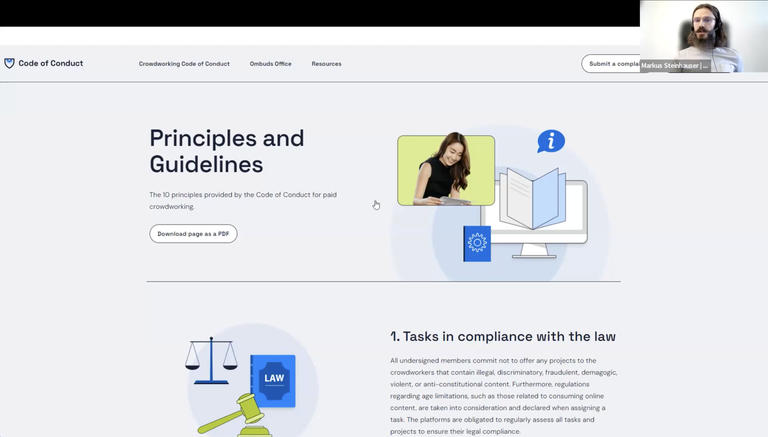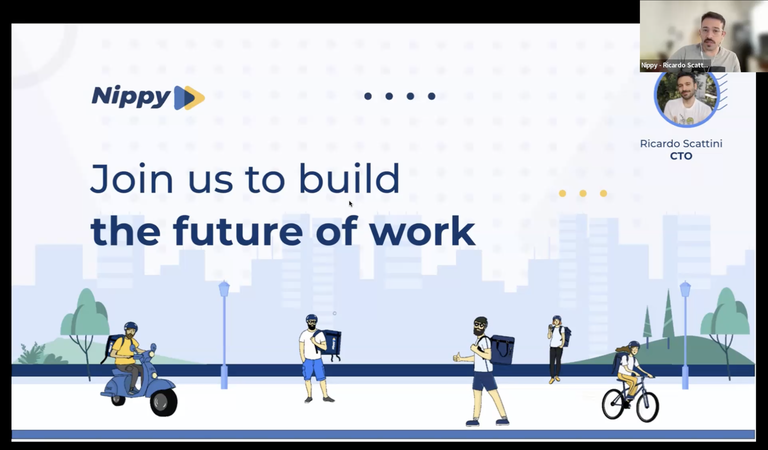‘A Level Playing Field for Gig Workers,’ WageIndicator’s seventh Gig Work webinar, started with Uma Rani’s speech revolving around the global impact of platforms on labour market and workers.
Then, three panelists discussed the real effect of protests, cooperatives, and regulation during the debate session.
Afterward, it was time to dig into the good practices session and present projects and initiatives contributing to a more level playing field in the gig economy.
To do so, platform expert and member of WageIndicator Gig Team Martijn Arets first shared a map highlighting 25 good practices in the global platform economy, including bottom-up initiatives, like Worker Info Exchange, initiatives by platforms (see the Wolt Algorithmic Transparency Report), external service providers, one for all GigCV, and other categories.
The representatives of two of the mapped initiatives joined the good practices session, and Martijn Arets talked with them about their projects.
Being workers' allies
Markus Steinhauser is the co-founder and COO of Munich-based crowdwork platform Testbirds and one of the initiators of the Crowdworking Code of Conduct.
Testbirds is a platform-enabled service that tests digital products, apps, and websites: real users get involved to give feedback, and Testbirds’ team approves their work and shares suggestions with the clients.
The Crowdsourcing Code of Conduct encompasses a set of ten principles that the signing companies pledged to stick to, including data protection, fair payment, good working conditions, and transparency in communication with workers.
“It’s a big work: twice a year, we get together with most of the companies that have signed the code and the German union that supports the project. We talk about specific cases, how to develop the code, and what’s happening on the regulatory level around the topic of crowdworking.”
So it's a team game, which adds further value to this good practice.
In addition, workers are sure to find an ally: “Suppose that I have an issue with a platform, try to contact them, but don’t get a response or no satisfactory response. We have launched the Ombuds office gathering representatives from different stakeholders to support workers or come up with recommendations for platforms. There is a form to fill in, and the only requirement is that you have already tried to resolve the issue with the platform first. In a lot of cases, it’s about payment.”
The Ombuds office is working on around 70 cases for 2023, Markus Steinhauser explained.
What if a platform that signed the code of conduct doesn’t adhere to the rules? “It is excluded from the code.”
In the end, “we are trying to take a couple of steps forward before legislation,” thanks to a third body that can intervene when platforms and workers can solve it themselves.
Listen to the interview with Marcus Steinhauser for the Gig Work Podcast

WORKERS' benefits and data collection
Moving on to the second guest of the good practices session, Martijn Arets gave the floor to Ricardo Scattini, CTO and CPO at Nippy, the first online Workertech that seeks to accompany gig economy freelancers, creating benefits and services for each of them.
Ricardo joined the webinar from Buenos Aires, Argentina.
“In Latin America, there are 5 million people chasing earnings on the gig economy,” he said, and what they see is a “fragmented community with no help at all.”
As a B2B2C platform, Nippy contributes to getting better conditions for workers by “packing services to the platforms, improving drivers and riders’ productivity through memberships, and helping workers increase their engagement with the platforms.”
As a part of this business model, they also provide spaces where “workers can rest, use a bathroom, grab a cup of coffee, repair their bikes, or charge their phones.” There are Nippy centres like these in Argentina, Mexico, and the Dominican Republic.”
However, the most important thing they are working on regards data collection.
“We monitor all the activities and interactions, from workers consuming benefits and services to using our maps to improve their productivity and earnings. This way, we have a complete picture of the worker and the platform, too. Using this huge amount of data and segmenting the audience and the offer, we are able to get the best benefits for our users.”

CONCLUSIONS
- To acknowledge the real impact of the platform economy on the global labour market, some perspectives are required to be broadened, examining the real work opportunities platforms offer and how they disrupt existing sectors. Legislation of different sectors is being applied to platforms since they cannot be considered only as IT companies anymore.
- When gig workers strike, pay is the main reason driving these actions. However, research shows that there are some differences in the way they are represented and former workers or trade unions can intervene based on workers’ demands. Do protests always work? There is a lot of ferment globally, and governments don’t remain indifferent.
- Among alternative platform economy models, cooperatives are recognized to offer decent working conditions. The real challenge is to make cooperatives stronger at the global level, not by replicating the same model everywhere but by adapting it to the local realities.
- When it comes to regulating platforms, governments have a great responsibility to ensure workers are guaranteed fundamental rights and existing laws are enforced.
- Good practices and initiatives represent a good opportunity to intervene in the field with concrete solutions to help workers, and they can benefit from collaboration with external stakeholders (governments, unions, and platforms themselves) to create more effective projects and be open to other visions and new possibilities.
The WageIndicator Gig Team has scheduled its next webinar on March 22, 2024. ‘Unpaid Labour in the Gig Economy’ will focus on the sensitive topic of unpaid labour in the platform work: how can it be defined? Does it mean the same thing for different categories of gig workers? Can it be quantified and mitigated?
